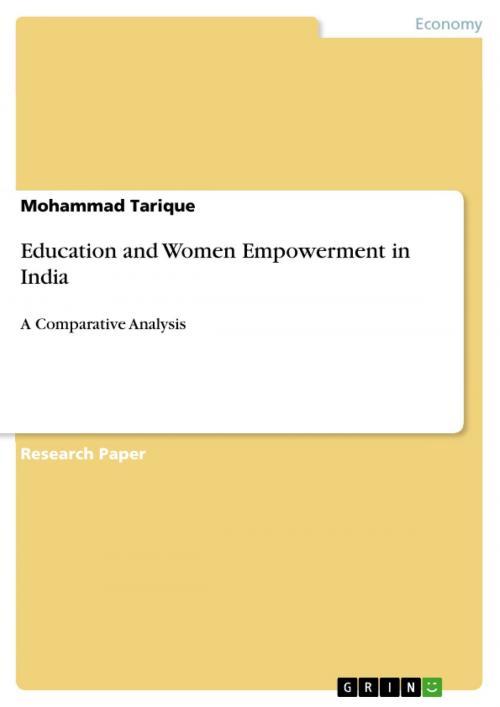Education and Women Empowerment in India
A Comparative Analysis
Business & Finance, Economics, Urban & Regional| Author: | Mohammad Tarique | ISBN: | 9783656089292 |
| Publisher: | GRIN Publishing | Publication: | December 23, 2011 |
| Imprint: | GRIN Publishing | Language: | English |
| Author: | Mohammad Tarique |
| ISBN: | 9783656089292 |
| Publisher: | GRIN Publishing |
| Publication: | December 23, 2011 |
| Imprint: | GRIN Publishing |
| Language: | English |
Research Paper (postgraduate) from the year 2011 in the subject Economics - Case Scenarios, Aligarh Muslim University (Aligarh Muslim University, Aligarh, India), course: Economics, language: English, abstract: International efforts to address gender inequality have largely emphasized education as a means of achieving women's empowerment. Education serves as the conduit by which women, long rooted in the private sphere, move into the public sphere and assert themselves on an equal basis with men. As a springboard to employment and economic independence, advocates say, education provides the critical foundation from which further empowerment flows. It is in this backdrop that the present paper tries to find the relationship between inequality in education and women empowerment. The entire paper is divided into three parts. The first part is introductory that talks about the second and third goal of MDGs which is achieving universal primary education and promote gender equality and empower women respectively with certain indicators to achieve these goals. This part also gives a brief account of the gender inequality in education and employment world wide. In the second portion, the importance of education in general and women education in particular has been highlighted. It talks about the gender inequality in literacy in India. A comparative analysis between different states of the country is being made with regard to the parameters like education dimension index and the same index if adjusted for inequality. Further, the parameters like inequality adjusted HDI, education and income index have been taken for few countries to make a comparative analysis. To find the impact of inequality in education on various other parameters, a correlation matrix has been calculated. To know the level of women empowerment in various parts of the world, the variables like female share in national parliament, percentage of female literacy and female labour force participation rate has been taken. The third and final part is given to concluding observations.
Research Paper (postgraduate) from the year 2011 in the subject Economics - Case Scenarios, Aligarh Muslim University (Aligarh Muslim University, Aligarh, India), course: Economics, language: English, abstract: International efforts to address gender inequality have largely emphasized education as a means of achieving women's empowerment. Education serves as the conduit by which women, long rooted in the private sphere, move into the public sphere and assert themselves on an equal basis with men. As a springboard to employment and economic independence, advocates say, education provides the critical foundation from which further empowerment flows. It is in this backdrop that the present paper tries to find the relationship between inequality in education and women empowerment. The entire paper is divided into three parts. The first part is introductory that talks about the second and third goal of MDGs which is achieving universal primary education and promote gender equality and empower women respectively with certain indicators to achieve these goals. This part also gives a brief account of the gender inequality in education and employment world wide. In the second portion, the importance of education in general and women education in particular has been highlighted. It talks about the gender inequality in literacy in India. A comparative analysis between different states of the country is being made with regard to the parameters like education dimension index and the same index if adjusted for inequality. Further, the parameters like inequality adjusted HDI, education and income index have been taken for few countries to make a comparative analysis. To find the impact of inequality in education on various other parameters, a correlation matrix has been calculated. To know the level of women empowerment in various parts of the world, the variables like female share in national parliament, percentage of female literacy and female labour force participation rate has been taken. The third and final part is given to concluding observations.















